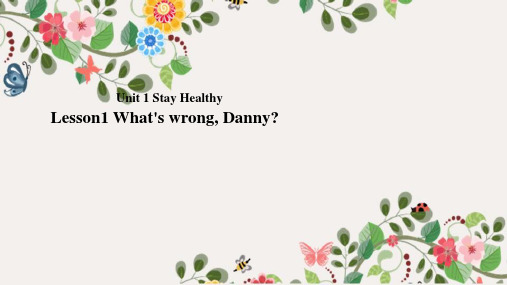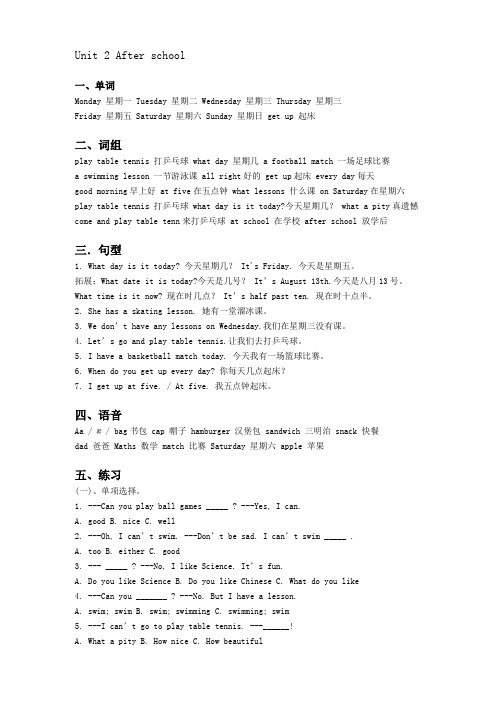What's up
《What's-the-Weather-like-Today-》PPT教学课件(第1课时)

rainy 下雨的
/ˈreɪni/
【短语】 rainy season 雨季 【例句】 It's rainy today. 今天下雨。 【拓展】 rain 雨
snowy 下雪的
/ˈsnəʊi/
【短语】 snowy day多雪的日子 【例句】 It is a snowy day. 今天有雪。
rainy 下雨的 snowy 下雪的 moon 月亮 star 星星
Homework
Homework
把今天学习的新单词做 成卡片,读给同学听。
【拓展】 snow 雪
moon /muːn/ 月亮
【短语】 full moon 满月 【例句】 The moon is in the sky.
月亮在天空中。 【拓展】 moonlight月光
mooncake月饼
star /stɑː(r)/ 星星
【短语】 bright star明亮的星星 【例句】 I can see a bright star in the sky. 我能
Unit 5 What's the Weather like Today?
陕旅版(三年级起点)五年级下册
Part A Let's learn
Warm-up/Revision Presentation
● Let's learn
Test Sum-up Homework
Warm-up/Revision
在天空中看到一颗明亮的星星。 【拓展】 star还可指明星,如: film star电影明星
游戏时间
下雨的
rainy
星星
star
根据汉语意思说单词
有风的
河南省八年级英语下册Unit5Whatwereyoudoingwhentherainstormcam

河南省八年级英语下册Unit5Whatwereyoudoingwhentherainstormcame知识点题库单选题1、Last Thursday when I got to the railway station, I ____________ I left my ID card at home. A.realizedB.believedC.thoughtD.considered答案:A句意:上星期四,当我到达火车站时,我意识到我把身份证忘在家里了。
考查动词。
A. realized意识到;B. believed相信;C. thought认为;D. considered考虑。
根据句中when I got to the railway station提示,此处是说到达火车站后,我意识到我把身份证忘在家里了,A选项符合句意,故选A。
2、—Good news! I got the last ticket to the concert.—How you are!A.activeB.strangeC.luckyD.funny答案:C分析:句意:——好消息,我买到了音乐会最后的票。
——你多幸运啊!A. active活跃的;B. strange 奇怪的;C. lucky幸运的;D. funny有趣的;根据I got the last ticket to the concert.我买到了音乐会最后的票,可知是幸运的;故选C。
3、——I am afraid I might forget to buy the bread after work.——Don't worry. I will you then.A.noticeB.allowC.remindD.promise答案:C句意:不要担心,我会提醒你的。
A. notice注意到; B. allow 允许; C. remind提醒; D. promise答应;许诺;根据Don't worry可知是会提醒你;故选C4、—Where is Mike?—I saw him_______with Mr. Smith in the hallways just now.A.to talkB.talkingC.talkedD.talks答案:B句意:——Mike在哪里?——我刚才看见他在走廊里和Smith先生谈话。
冀教九上Unit1 Lesson1What’swrongDanny课件

4.Though it's very late in the night, the hospital is still opeTn.(
)
F
5.A doctor talked to Mr Dinosaur and tFook them to a room.(
)
6.Mrs Dinosaur will stay with Danny .〔 〕
They arrived at a decision after much thought at last. 最后他们经过反复考虑后做出了决定。
Attention: arrive in后一般接表示大地方的名词;arrive at后一般接 表示小地方的名词。 reach, get to与arrive at/in的区别 三者都有“到达〞之意。所不同的事,reach是及物动词, 后面可直接接表示地点的名词。get加上to,即get to才是“ 到达〞的意思。arrive为不及物动词,要加上介词at/in才 能接表示地点的名词。 --When did you reach /get to/arrive in Hangzhou? 你是什 么时候到杭州的? --I reached /got to /arrived in Hangzhou yesterday evening. 我是昨天晚上到的杭州。 When she reached /got to/arrived at the shop, she found the shop was closed. 当他到达商店时,他发现门关了。
情况正在好转! b.寻访到,探访〔某人〕 On my way home, I looked up an old friend of mine. 在回家 的路上,我去看望了一下我的老朋友。
人教版英语八年级上册Unit6知识点详解

Unit 6 I m going to study computer science.知识点梳理1、cook厨师cook此处用作可数名词,意为厨师”。
His father is a great cook. 他的父亲是一位优秀的厨师。
I want to be a cook when I grow up. 我长大后想成为一名厨师。
[拓展]①cook还可作动词,意为烹调,煮,烧”。
Every girl should learn to cook. 每个女孩都应该学习做饭。
My mother is cooking the fish. 我妈妈正在做鱼。
②cooker可数名词,意为厨具”。
He bought a new gas cooker. 他买了一个新煤气灶。
2、scientist 科学家scientist可数名词,意为科学家”,是以后缀-ist结尾的表示职业的名词。
常见的以-ist结尾的职业名词还有:pianist 钢琴家;artist艺术家;violinist小提琴手。
[拓展]本单元出现的职业的名词(短语)还有:computer programmer 计算机程序设计员cook 厨doctor 医生engineer工程driver 驾驶员pilot 飞行员pianist钢琴家teacher教师actor演员basketball player篮球运动员3、What do you want to be when you grow up? 你大后想成为什么?(1 )want to be意为想成为• • •,•后常加表示职业的名词。
He wants to be an artist. 他想成为一名画家。
Does he want to be a singer like his uncle? 他想成为一名和他叔叔一样的歌手吗?(2 ) when意为当• ••时候”,引导时间状语从句。
在含有when引导的时间状语从句的主从复合句中,如果主句和从句的动作都发生在将来,主句用一般将来时,从句常用一般现在时表示将来,即主将从现”。
译林版小学四年级英语下册-4B第二单元知识点及练习

Unit 2 After school一、单词Monday 星期一 Tuesday 星期二 Wednesday 星期三 Thursday 星期三Friday 星期五 Saturday 星期六 Sunday 星期日 get up 起床二、词组play table tennis 打乒乓球 what day 星期几 a football match 一场足球比赛a swimming lesson 一节游泳课 all right好的 get up起床 every day每天good morning早上好 at five在五点钟 what lessons 什么课 on Saturday在星期六play table tennis 打乒乓球 what day is it today?今天星期几? what a pity真遗憾come and play table tenn来打乒乓球 at school 在学校 after school 放学后三.句型1. What day is it today? 今天星期几? It's Friday. 今天是星期五。
拓展:What date it is today?今天是几号?It’s Aug ust 13th.今天是八月13号。
What time is it now? 现在时几点?It’s ha lf past ten. 现在时十点半。
2. She has a skating lesson. 她有一堂溜冰课。
3. We don’t have any lessons on Wednesday.我们在星期三没有课。
4. Let’s go and play table tennis.让我们去打乒乓球。
5. I have a basketball match today. 今天我有一场篮球比赛。
6. When do you get up every day? 你每天几点起床?7. I get up at five. / At five. 我五点钟起床。
- 1、下载文档前请自行甄别文档内容的完整性,平台不提供额外的编辑、内容补充、找答案等附加服务。
- 2、"仅部分预览"的文档,不可在线预览部分如存在完整性等问题,可反馈申请退款(可完整预览的文档不适用该条件!)。
- 3、如文档侵犯您的权益,请联系客服反馈,我们会尽快为您处理(人工客服工作时间:9:00-18:30)。
What's up
"What's up?"和"How are you doing?""How's it going?"以及"What's new?"……,都是美国人常说的寒暄语,一般认为是从黑人语言中而来,是很常用的打招呼方式。
"What's up?"就是问对方近来如何,有点像中文里的“最近怎样”,通常没什么事就会回答"Not much"或者"Nothing"。
不过,还有一种情况也很常见,就是对方也回答了一句"What's up?"。
在这种情况下,"What's up"几乎相当于"Hello"。
"What's up?"也常被用来问人家有什么事,比如别人登门拜访,你就可以用,意为“有何贵干哪”。
